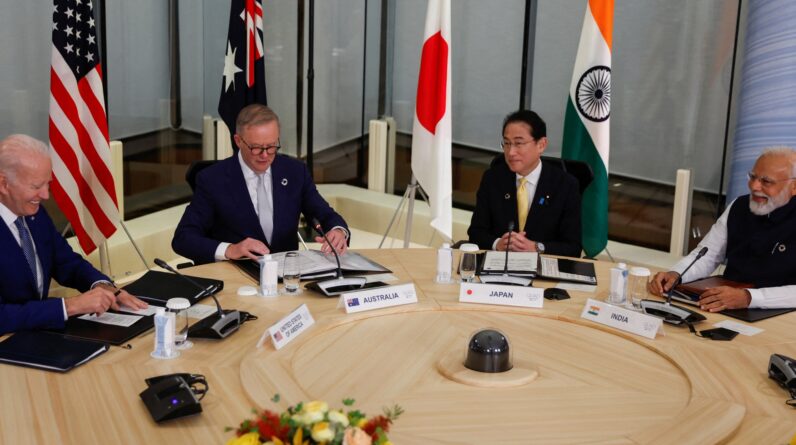
The leaders of Australia, India, Japan and the United States issue a statement calling for stability in the Indo-Pacific region.
The leaders of the Quad group (Australia, India, Japan and the United States) have taken a look at Beijing’s behavior at a summit in Hiroshima.
US President Joe Biden and his three partners in the group did not mention China by name on Saturday, but the superpower was clearly the target of language in a joint statement calling for “peace and stability in the maritime domain of the “Indo-Pacific”.
“We strongly oppose destabilizing or unilateral actions that seek to change the status quo by force or coercion,” the statement said, using diplomatic language that appeared to refer to China’s economic tactics to gain influence over the poorest countries, as well as their military expansion in the country. peaceful
“We express great concern over the militarization of disputed features, the dangerous use of coast guard vessels and maritime militias, and efforts to disrupt the offshore resource exploitation activities of other countries,” the statement added, clearly referring to Chinese base building on ancient reefs. and the harassment of non-Chinese vessels in disputed waters.
The leaders of the Quad held their meeting while they were already meeting in Hiroshima for a G7 summit.
Australian Prime Minister Anthony Albanese was due to host Biden, Japanese Prime Minister Fumio Kishida and Indian Prime Minister Narendra Modi in Sydney next week.
However, Biden pulled out, saying he had to return to Washington from Japan on Sunday to negotiate with Republican opponents on the US debt ceiling.
Biden apologized for forcing the change of plans and has invited Albanese to make a state visit to the White House.
In their statement, they emphasized the Quad’s support for infrastructure improvements in the vast Asia-Pacific region, although they said, in another apparent dig at China, that they wanted to help such investments but that “would not impose unsustainable debt burdens” on aid recipients. .
Among the projects highlighted by Quad leaders is the “urgent need to support quality submarine cable networks in the Indo-Pacific, which are key to global growth and prosperity.” They announced a partnership with the aim of leveraging their countries’ expertise in the specialist maritime cable sector.
They also said an existing pilot program for high-tech monitoring of illegal fishing would be expanded.
And they said they were “deeply concerned” by the crackdown in Myanmar and condemned “North Korea’s destabilizing ballistic missile launches and pursuit of nuclear weapons in violation of multiple UN Security Council resolutions.”
Kishida warned that the security environment has become even more difficult since the alliance’s most recent meeting last year. Modi announced that the next summit of the four countries will be hosted by India in 2024.
[ad_2]
Source link





